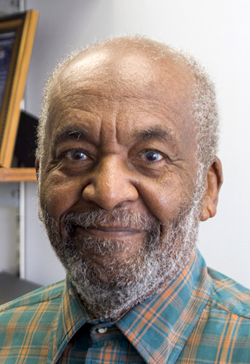Filed Under > TC People
TC's EDMUND GORDON TO LEAD NATIONAL COMMISSION ON ASSESSMENT IN K-12 EDUCATION
The professor emeritus and leading educational psychologist will lead a two-year study group that will consider what educational assessment will look like in the coming decades.
Concerns over current and future emerging changes in the U.S. education enterprise have led Edmund W. Gordon, professor emeritus at TC and Yale and one of the nation's premier educational psychologists, to lead a two-year study group—the Gordon Commission on the Future of Assessment in K–12 Education.
The Gordon Commission will consider what educational assessment will look like, and what it should be capable of doing, now and through the middle of the 21st century. “Present-day knowledge and technological bases for educational assessment could be insufficient to meet the changing demands of the education enterprise in the next 40 years,” said the Commission’s press release.
"We need to address these changes now in order to improve the educational opportunities for all people and drive innovation in educational assessment,” Gordon said. “The work of this commission will be completely transparent and serve to inform teaching and learning in the pursuit of excellence and equity in education."
According to the press release, the Commission will be “a two-year study group comprised of thought leaders, trailblazers and innovators in academia, research and policy [that] seeks to harness emerging developments in the pedagogical, cognitive and technological sciences to improve K–12 educational assessment—now and into the mid-21st century.. “Its mission is to analyze the best assessment practices and our nation's current and future educational needs, and generate recommendations that will improve pedagogical practice, educational measurement and student achievement.”
Comprising more than 20 of the most distinguished scholars in the fields of education sciences, psychometrics, and public policy, and chaired by Gordon, the commission will try to determine the future direction of assessments and practices in education by examining their
• Purpose,
• Structure and design,
• Modes of delivery and scoring,
• Uses of instruments and assessment data,
• The management and interpretation of assessment, program, and student characteristics and performance data.
"It is critical that we further examine how effectively to tap into emerging research and development in order to improve teaching and learning through assessment and the better use of educational measurement." Gordon added. "Just as the paradigms for education are shifting, our models for assessment will need to change—perhaps moving from a primary concern for accountability and prediction to a greater focus on descriptive diagnosis to inform teaching and learning transactions."
During year one, the commission will explore: what education is expected to become and should be by 2050; what will be the consequent demands on the educational assessment enterprise; and what technical and theoretical solutions to those demands are conceivable.
During year two, the commission will develop specifications for procedures, instrumentation, data management systems and administrative policies and practices that are appropriate to the identified changing demands, as well as develop policy positions that respond to those demands.
Gordon expressed the appreciation of the Commission members and himself to ETS for its initial funding and logistical support for the Gordon Commission, but he stressed that the commission will “conduct its work autonomously and independently.” He indicated that the commission will seek additional funding from other corporate, public and philanthropic sources.
Published Thursday, May. 19, 2011
